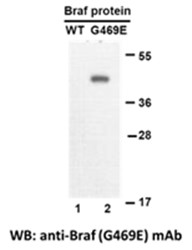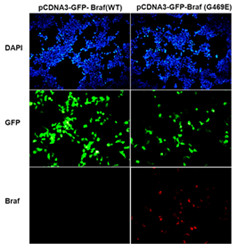| Cat. #: TD-26196 |
| Gene Symbol: BRAF, BRAF1, RAFB1 |
| Description: Anti-BRAF(G469E) Mouse Monoclonal Antibody |
| Background: BRAF belongs to a family of serine-threonine protein kinases. As a part of a signaling pathway known as the the RAS/MAPK pathway, it plays an important part in many cellular processes. The processes include cell proliferation, differentiation and transcriptional regulation. Mutations in the BRAF gene cause diseases. Inherited mutations in BRAF cause cardiofaciocutaneous syndrome. Acquired mutations in BRAF have been found in cancers. |
| Immunogen: A synthetic peptide from the internal region of BRAF which includes the mutation of G469E, human origin. |
| Applications: ELISA, WB, IHC |
| Recommended Dilutions: ELISA: 1:1000-1:5000 、WB: 1:500-1:1000 、IHC: 1:50-1:100 |
| Concentration: 1mg/ml |
| Host Species: Mouse |
| Format: Liquid |
| Clonality: Monoclonal |
| Isotype: IgG |
| Purity: Purified from ascites |
| Preservative: No |
| Constituents: PBS (without Mg2+ and Ca2+), pH 7.4, 150 mM NaCl, 50% glycerol |
| Species Reactivity: Recognizes G469E mutant, but not wild type BRAF of vertebrates. |
| Storage Conditions: Store at -20°C. Avoid repeated freezing and thawing |
| Western blot:
Immunofluorescence:
|
Western blot analysis of recombinant BRAF (G469E) and wild type proteins. Purified His-tagged BRAF (G469E) protein (lane 2) and corresponding wild type protein (lane 1) were blotted with Anti-BRAF(G469E) monoclonal antibody (cat. # TD-26196).
Immunofluorescence of cells expressing BRAF proteins with Anti-BRAF(G469E) antibody. HEK293T cells were transfected with pCDNA3-GFP-BRAF (WT) plasmid (left column) or pCDNA3-GFP-BRAF (G469E) plasmid (right column), then fixed and stained with Anti-BRAF(G469E) monoclonal antibody (cat. # TD-26196).
|


